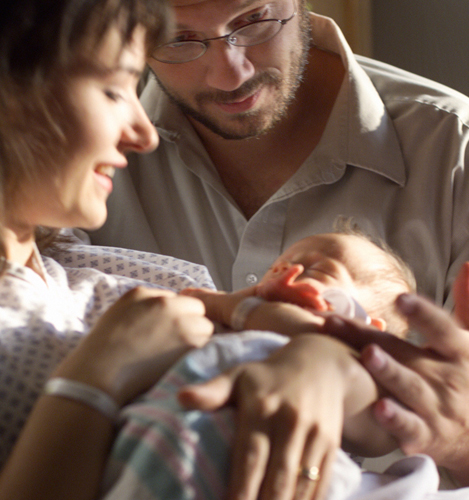A few minutes ago you were a couple—and now you are
parents! The moment you have been dreaming of for nine months has
finally arrived… so what happens next?
Nothing compares with the moment when you meet your baby face to face.

Of course your
experiences will depend on your labor and birth and local procedures,
but here is what usually occurs in your first 12 hours after birth.
1–2 hours
As long as he is well, your
baby can be placed in your arms, and you can cuddle him and make the
most of these first magical moments. The doctor or your partner will cut
the umbilical cord after a few minutes, or once it stops pulsating. You
may feel elated, relieved, or just exhausted. Don’t be alarmed if you
start to vomit, shake vigorously, or feel too exhausted to even hold
your baby at first. These are all very normal post-birth sensations.
If your baby is fine and
you want to breast-feed, put him to the breast, but he may just nuzzle
at first. Snuggle him close, skin to skin: the warmth of your body is
all he needs right now. At 1, 5, and 10 minutes, your baby will be
observed and given an Apgar score .
He will be wiped with a soft towel and his fingers and toes checked. He
will then be weighed and his head circumference measured. He will also
have a hearing test in the first hours.
But you also have work to
do. As soon as your baby is born, you have to push once more to expel
the placenta. You’ll have milder contractions that detach the placenta
from your uterus. After about 10 or 20 minutes (sometimes longer),
you’ll be done .
If your perineum tore, or
you had an episiotomy (a cut to ease your baby out), you may need
stitches. You’ll be given a local anesthetic, unless you already have an
epidural, so you don’t feel a thing. Your partner can hold your baby
and sit close by while you are stitched.
2–3 hours
Time to refuel: many women say their first drink of water and snack after giving birth are the best they’ve ever tasted… enjoy.
If you’re feeling
fine and there are no concerns about your condition, you’ll likely be
moved to the room on the maternity ward where you’ll spend the remainder
of your time in the hospital. You’ll be taken there in a wheelchair
with your baby in your arms. (In some hospitals, you’ll never leave the
room where you deliver; some labor and delivery rooms are designated as
postpartum rooms, as well.)
3–4 hours
After the exertion of
giving birth, you’ll be sweaty, sticky, and in need of a shower, which
you can have now if you didn’t have an epidural. Ask a nurse or your
partner to walk with you if you’re wobbly. Afterward you’ll feel like a
new woman and can put on a breast-feeding bra for comfort.
5–6 hours
Off to the bathroom? The
first time you urinate it can sting, especially if you had stitches, so
pour a cup of warm water over your perineum as you urinate. The hospital
needs to know everything is in good working order before you leave its
care. You’ll need to use sanitary pads to soak up the vaginal blood loss
(lochia).
7 hours
This might be the first
chance you’ve had to look at your baby’s tiny toes, scrunched-up legs,
or fine head of hair. There may be traces of greasy vernix on his skin.
Perhaps he has long, flaky fingernails that need trimming or a downy
fuzz of hair called lanugo on his back. He’s unique and gorgeous.
8 hours
If your baby is awake, he
may be hungry. At this stage, you’re producing nutrient-rich colostrum, a
fluid containing antibodies. Position him at the breast: he should open
his mouth wide and take the entire areola, known as “latching on.”
Breast-feeding stimulates the release of the hormone oxytocin, which
contracts the uterus. This can cause afterpains, more noticeable in
second and subsequent births, which can feel like contractions. The only
consolation is that with each contraction, your uterus—and hence your
abdomen—shrinks back down.
9 hours
If you’re up to it, you
might be ready for visitors, either at home or on the unit, to admire
your baby. Don’t let them tire you out, though.
10 hours
Your baby’s newborn
checkups will take place when he is between 4 and 48 hours old. A staff
pediatrician at the hospital will examine him from top to toe; listen to
his heart, check his hips (and testes in a boy); and ask about the
contents of his diapers.
11 hours
In many hospitals, you
can spend your first night as a new family together, since rooming-in
with the baby is a common practice and new dads often sleep over. This
lets the nurses see how mother and baby interact. If you need to get a
few hours of uninterrupted sleep after a long or difficult labor, a
nurse can collect the baby from you.
12 hours
After a whirlwind of
agony, ecstasy, and sheer hard labor, you need to rest when you can. If
your baby is sleeping, fend off visitors, draw the curtains around your
bed, or take the phone off the hook, and sleep.